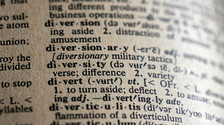azahrah.qolbaina
what the things that make verb 2 and verb 3 different
I was confised by verb 2 and verb 3. Can you explain it?
١٦ مارس ٢٠١٢ ١١:١٦
الإجابات · 3
What is verb 1?
١٦ مارس ٢٠١٢
It sounds like you're asking about patterns like "see - saw - seen", or (Brad's example) "go - went - gone".
Basically, the past participle ("verb 3") always needs a helping verb. Always. It can't function without one. So you can say "I have seen" or "it is gone", but "it gone" and "I seen" are completely wrong; you need "it went" and "I saw" (simple past) in these cases.
You use the past participle in perfect tenses (I have seen; I had eaten; I will have spoken), hypothetical forms using "have" (I should have known; it could have sunk), or passive forms (it is known; that was eaten).
Verb 2 (past simple) is the basic past tense of the verb.
١٦ مارس ٢٠١٢
Are you talking about the simple past (e.g., "went") vs. the past participle (e.g., "gone")?
١٦ مارس ٢٠١٢
لم تجد إجاباتك بعد؟
اكتب اسألتك ودع الناطقين الأصليين باللغات يساعدونك!
azahrah.qolbaina
المهارات اللغوية
العربية, الإنجليزية, الإندونيسية, التركية
لغة التعلّم
العربية, الإنجليزية, التركية
مقالات قد تعجبك أيضًا

Top 6 Mistakes to Avoid with Vocabulary Acquisition
38 تأييدات · 10 التعليقات

Navigating Your First Job: Do's and Don'ts in the Workplace
47 تأييدات · 21 التعليقات

What Content to Watch to Acquire Advanced-level Proficiency
79 تأييدات · 50 التعليقات
مقالات أكثر
